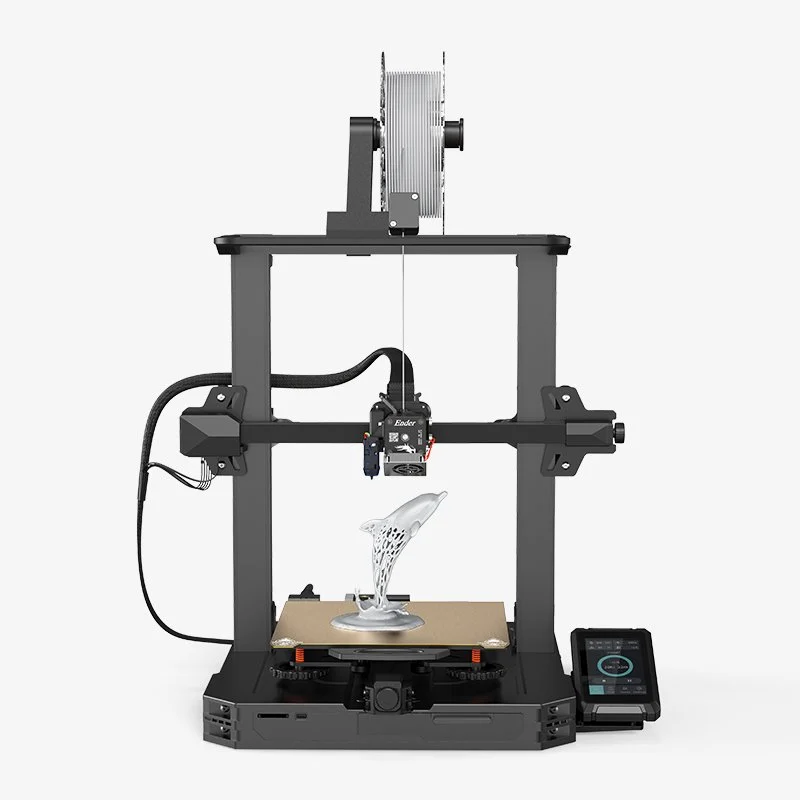Compare Ender 3 S1 PRO vs Mars 5
Comparison between the best 3D printers
Choose the best 3D printer at the best price. The cheapest 3D printers are here.
Buy a 3D printer here with 3D Fila.
 |
 |
|
| Model | Ender 3 S1 PRO[BUY Ender 3 S1 PRO] |
Mars 5[BUY Mars 5] |
| Printing Material | Filament | Resin |
| Buy Filament for Creality 3D Ender 3 S1 PRO | Buy Resin forElegoo Mars 5 | |
| Estimated price | $499,00 | $199,00 |
| Manufacturer | Creality 3D | Elegoo |
| Release Year | 2022 | 2024 |
| Print Volume [mm] | 220x220x270 | 143x89x150 |
| Printer Size [mm] | 450x49x620 | 230x230x433 |
| Weight [kg] | 8,7kg | 6,6 |
| Power Loss Recovery | YES | NO |
| Maximum Resolution [mm] | 0,1 | 0,01 |
| Processor | ||
| Display | Display touchscreen 4,3'' | Touchscreen 3,5'' |
| Power Supply | 350 | |
| Connectivity | SD | USB |
| Operating systems | Windows, Mac, Linux | Windows, Max, Linux |
| Date of registration in the system | 2022-10-11 | 2025-04-23 |
| Release date | 2022 | 2024 |
| Extra features | Creality's Ender 3 S1 PRO is an innovation in the Ender 3 series, featuring a Sprite Pro Extruder capable of reaching 300°C and dual lead screws on the Z axis, ensuring greater stability and print quality. Its PEI-coated print bed, combined with CR-Touch automatic leveling, provides excellent adhesion and ease of part removal. The user interface, via a 4.3-inch touchscreen, offers intuitive and efficient control, although it has some limitations regarding the handling of long file names and navigation. The well-designed extruder ensures effective cooling and handling of various filaments, although there may be a slight ghosting effect at high speeds due to its weight. This printer represents a balance between technological advances and operational challenges, remaining faithful to the quality expected of the Ender line. | Elegoo Mars 5 features a 6.6 4K monochrome LCD screen and 35um XY resolution, with auto-leveling and system check at startup. It includes smart sensors to alert for leveling failure, resin shortage, and residue detection. Using MSLA technology with a 405 nm COB light source, it also offers a 3.5 touch screen and supports various resins, including washable, ABS-like, and plant-based types. |
| Support for multiple colors and materials (AMS and CFS) | NO | NO |
Notes * |
||
| Cost-benefit | 7 / 10 | 8 / 10 |
| Hardware | 2.4 / 10 | 1.6 / 10 |
| Tela | . | . |
| Print volume | 3 / 10 | 3 / 10 |
| Performance | 1 / 10 | 9 / 10 |
| [BUY Ender 3 S1 PRO] | [BUY Mars 5] |
Conclusion |
| In comparing the Ender 3 S1 PRO and the Mars 5, several key factors influence which printer may be the best choice for potential buyers. The Ender 3 S1 PRO offers a larger print volume and a more versatile material compatibility, making it suitable for a broader range of applications, especially for those who plan to work with multiple filament types. Its advanced features, such as dual lead screws on the Z-axis and a PEI-coated print bed, contribute to its stability and print quality, albeit at a higher price point. The substantial resolution improvements and power loss recovery feature add robustness to its overall operation. On the other hand, the Mars 5 stands out with its high resolution and affordability, making it an attractive option for hobbyists and beginners. Its compact design and resin printing capabilities allow for fine detail and intricate designs, which can be a significant advantage in certain projects. Moreover, it has additional safety features, including smart sensors for monitoring the printing process. Nevertheless, its smaller print volume limits the types and sizes of projects it can accommodate compared to the Ender 3 S1 PRO. Considering cost-effectiveness and specific printing needs is essential. For those prioritizing larger builds and material diversity, the Ender 3 S1 PRO justifies its price, while the Mars 5 is ideal for beginners or those focused on detailed resin prints without breaking the bank. Ultimately, the choice between the two should be based on individual printing requirements, budget constraints, and intended usage scenarios. |

